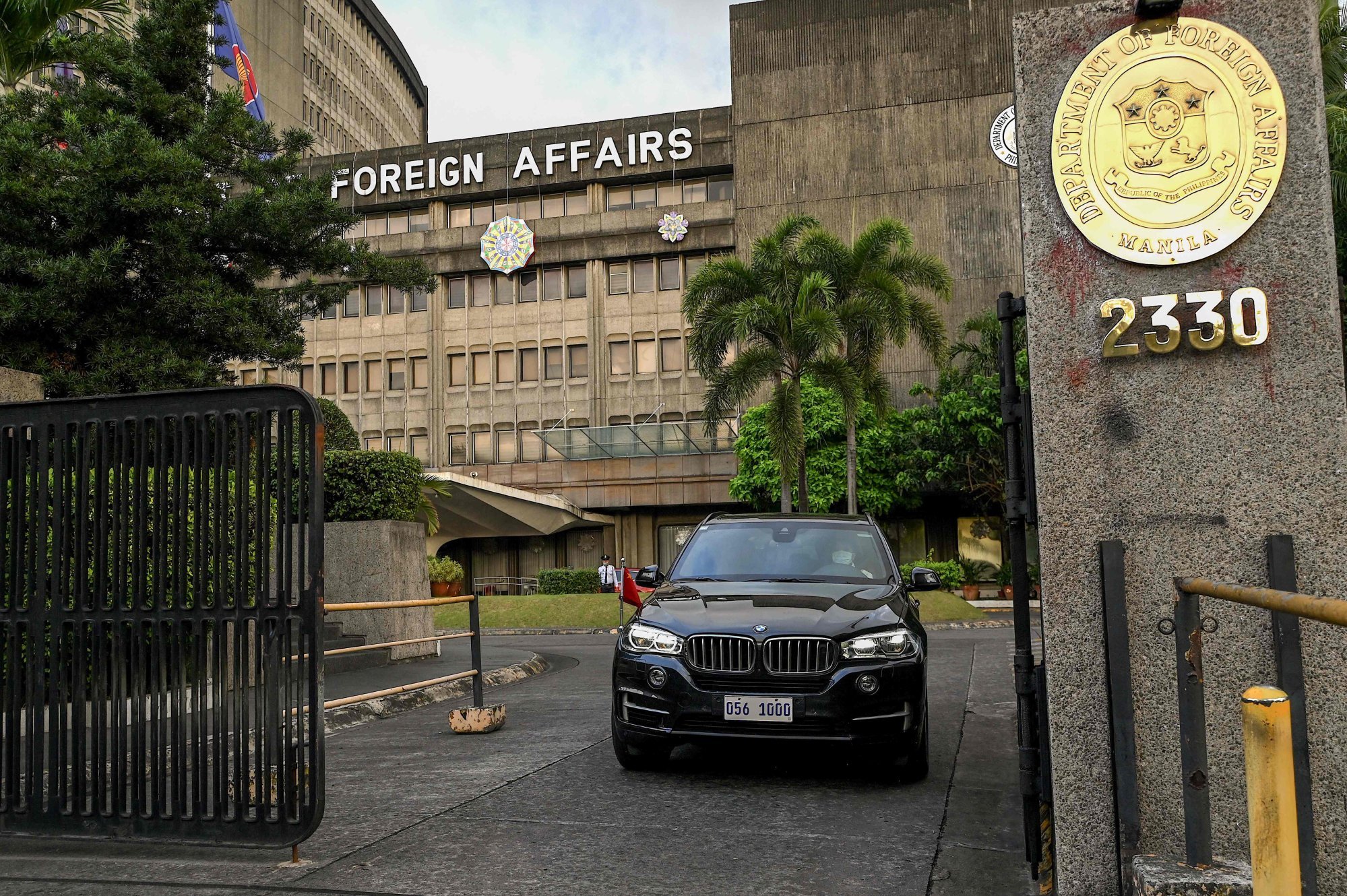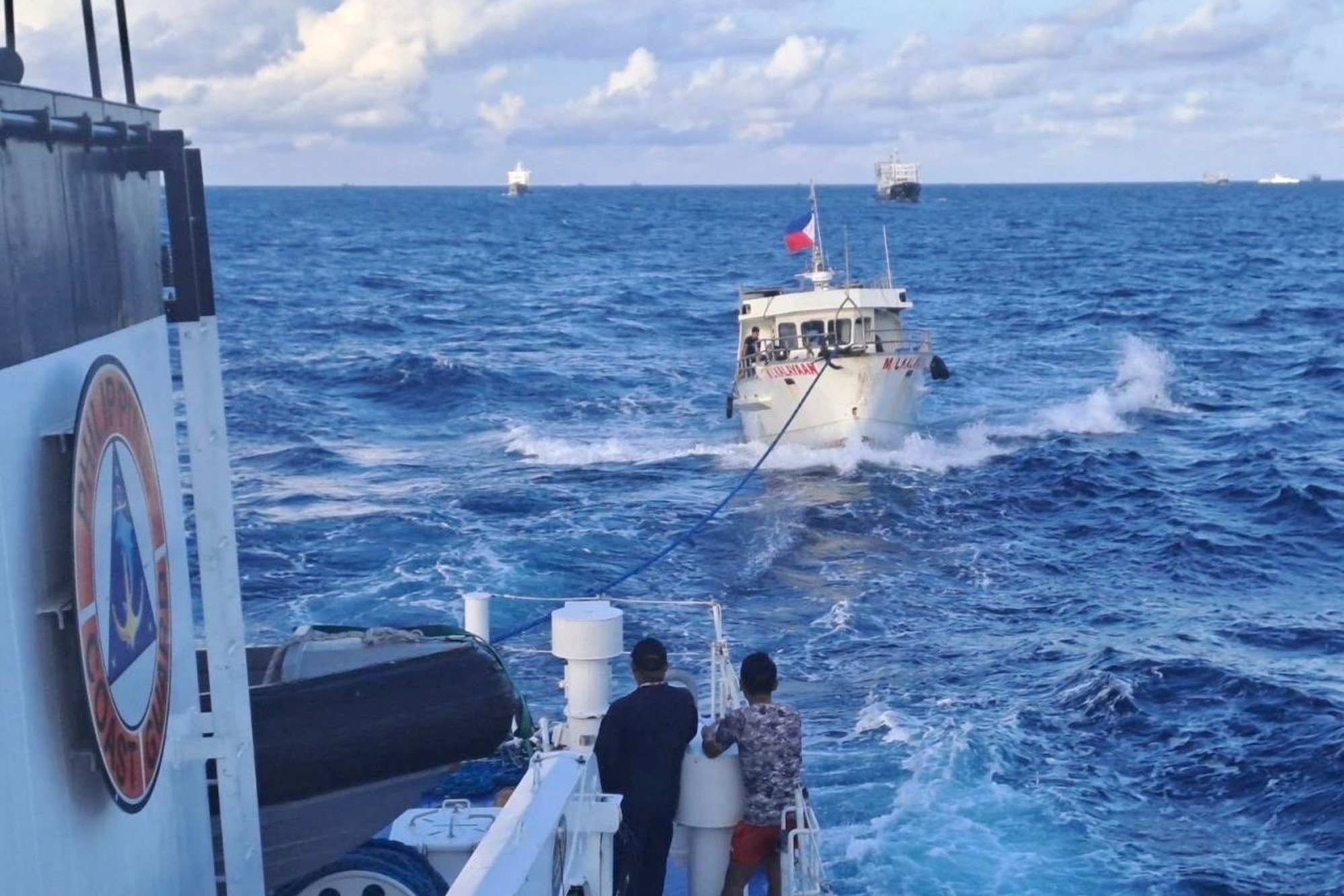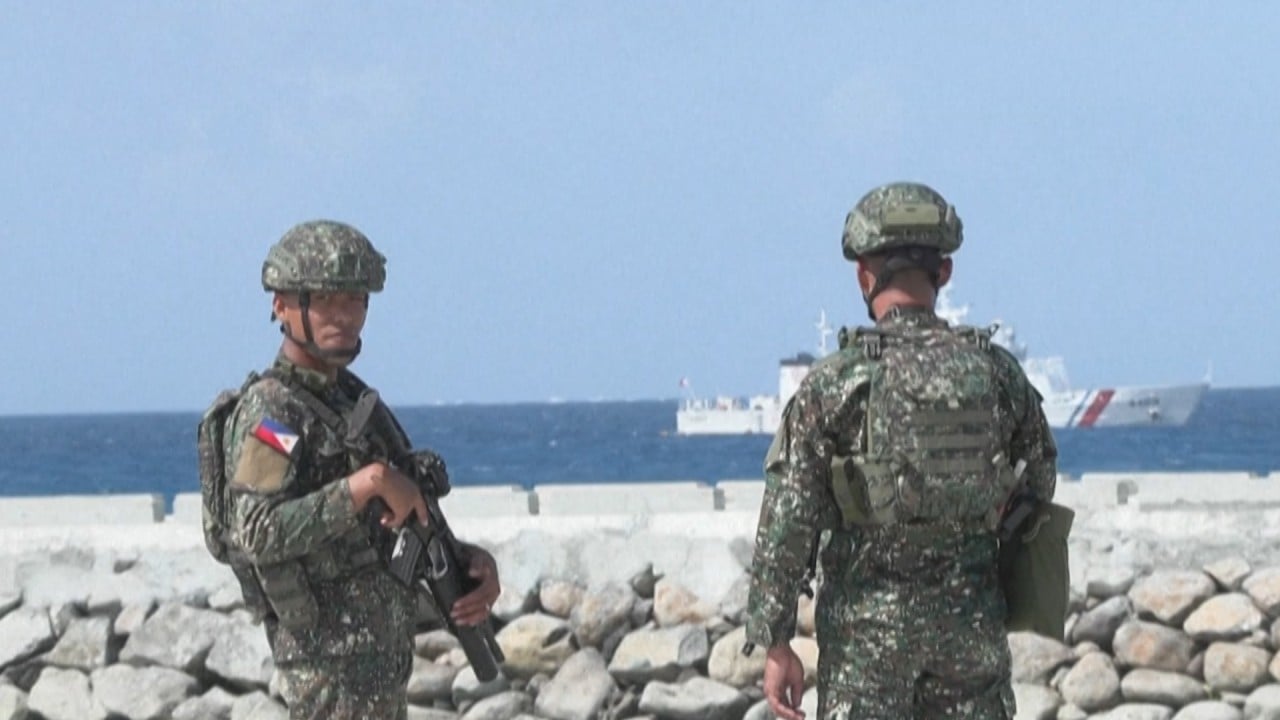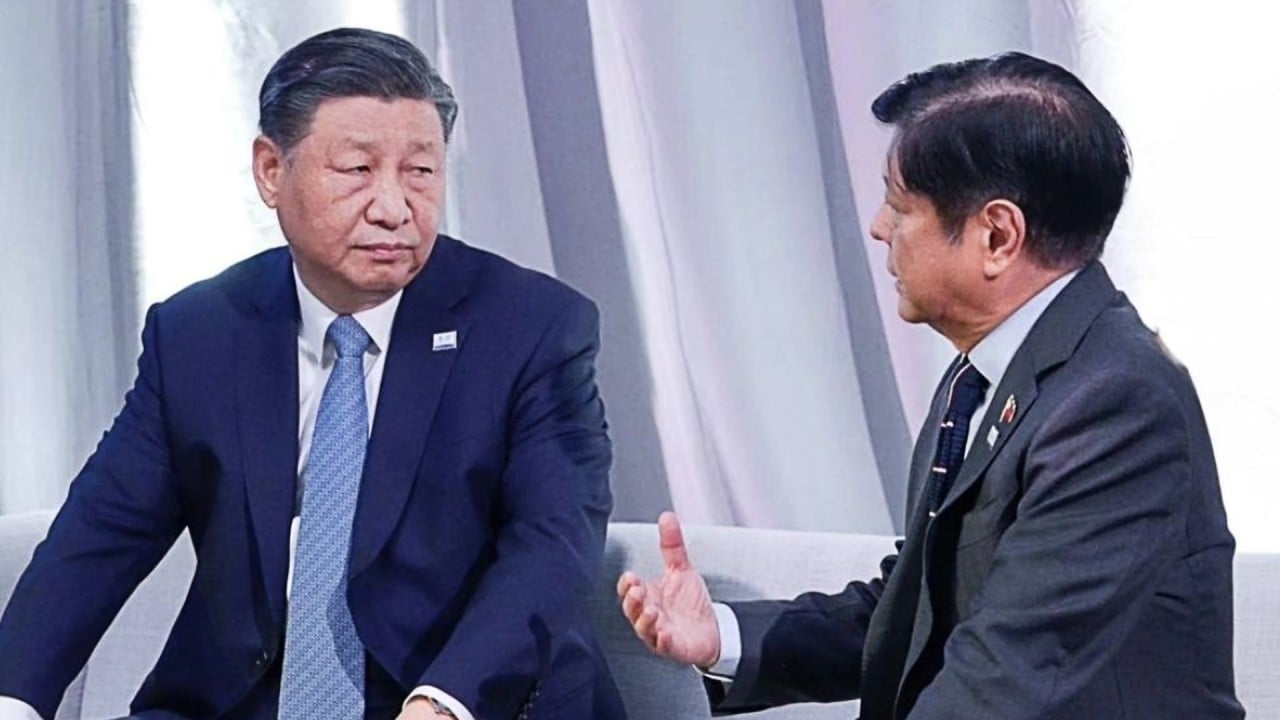
‘We can’t change our neighbours’: Sy-Coson’s call for diplomacy with China reveals rift among Philippines business leaders
- Top Philippine tycoon urges restraint and talks with China as tensions escalate in South China Sea
- Other Philippines business leaders back vigorous assertion of the country’s maritime sovereignty with the US as close partner
The Philippine business community appears divided over President Ferdinand Marcos Jnr’s handling of the rising tensions in the South China Sea, with the head of the nation’s biggest conglomerate speaking out against his increasingly aggressive approach, while others advocate for a stronger, US-backed defence of Manila’s maritime rights against China’s encroachment.
Earlier this month, SM mall, real estate and banking magnate Teresita Sy-Coson, 70, hosted a Christmas dinner and shared with select journalists her concerns over the government’s handling of conflict in the contested waterway.
Just days before her dinner, the Philippines and China had traded accusations of deliberately ramming each other’s vessels on December 10 near Ayungin Shoal (which China calls Ren’ai Jiao) where Manila is trying to repair an old, beached navy vessel, BRP Sierra Madre, which serves as a military outpost.
China’s coastguard blames Philippine boats for ‘collision’ near disputed shoal
In an arbitration suit filed by the Philippines, the International Tribunal for the Law of the Sea ruled in 2016, among others, that Ayungin is “within the exclusive economic zone and continental shelf of the Philippines”, but China rejected the ruling.
The latest Ayungin incident had prominent Filipino lawmakers loudly calling for China’s envoy to Manila, Huang Xilian, to be sent home. Senator Ronald “Bato” de la Rosa, an ally of former president Rodrigo Duterte who had pivoted the country towards China and away from the United States, even changed his tune and said the Philippine Coast Guard should retaliate in kind.
“Our coastguard should also be armed and use powerful water cannons and lasers” like those of their Chinese counterparts, De la Rosa said. “I’m just being practical. We cannot forever be scrambling like mice avoiding a cat.”
Subsequent write-ups by those who attended Sy-Coson’s dinner indicated that she was not in favour of such tit-for-tat tactics. She was quoted as saying, “China is very close to us. We cannot be too antagonistic.”

She indicated she disagreed with the Marcos Jnr government’s strategy of publicising every sea encounter and becoming America’s most enthusiastic partner in its Indo-Pacific strategy, and advised the government to instead return to the table with China.
“Even though we know what is happening, I guess we have to do it through more peaceful negotiations,” she said without elaborating what she thought was happening.
“I think we have to look at our own position. We don’t want to get involved in the US-China tensions,” she added. “What we have to do is have peaceful discussions with them [China] because, after all, we can’t change our neighbours.”
It was the first time a top Filipino business leader spoke out on the ongoing geopolitical tensions.
Sy-Coson explained that the tensions could affect the country’s business prospects, saying that the Philippine’s economy was OK when “left to our own devices”.
“We just hope there will be no skirmishes in that area because whatever happens [in the South China Sea] will affect us, all of us,” she said.
Beijing flexes muscles in South China Sea as Manila puts it on the defensive
Although she did not say it outright, some write-ups on her Christmas dinner portrayed it as Sy-Coson arguing that further tensions could hurt business.
Many Filipino-Chinese businessmen share her sentiments, according to Teresita Ang-See, founding president of Kaisa Para sa Kaunlaran (United for Progress), a movement to help Chinoys, or ethnic Chinese-Filipinos, to integrate into mainstream society.
Ang-See told the This Week in Asia that Chinoy businessmen preferred “peace and order, harmony [because these] are conducive to a good business climate. Unrest, uncertainties, threats, adversely affect business”.
She said this was “proven” during the conflict between the Philippine government and Muslim rebels in Jolo in the 1970s, which prompted Chinoy businessmen to leave Jolo, and again at the height of anti-Chinese kidnappings in the 1990s.
Despite being a minority, ethnic Chinese businessmen currently control large sections of the economy. Thirty of Forbes magazine’s 50 richest Filipino tycoons in 2023 are of Chinese descent, with one – David Consunji – tracing his lineage back to Confucius. Many have kept up their kinship ties to mainland Chinese relatives.
However, Ang-See explained that when it comes to Manila and Beijing’s conflict in the South China Sea, “Chinese-Filipinos in general condemn China’s action”.
“Many understand that China’s assertiveness and aggressiveness are responses to the US, Japan, Australia’s provocations and increasing military presence in the Philippines,” she said.
For this reason, “the Ayungin shoal harassment by China is very unfortunate,” she added.
When asked whether China could again resort to economic sanctions, as it did in 2012 following the stand-off in Scarborough Shoal, Ang-See said: “Remember, Spain, Britain, US, Japan, they all came to the Philippines in their gunboats and occupied our country. China came in their trading vessels for commerce. China wants nothing more than to continue its lucrative trade, especially with its neighbours.”
“Imposing sanctions is what the US does [like the embargo of Cuba] but not China.”
Ang-See added, “This is the best time to give diplomacy a chance, tap seasoned diplomats like Ambassador [to China] Jaime FlorCruz and Ambassador [and current Foreign Secretary Enrique] Manalo … Give the seasoned diplomats [a chance] to let diplomacy work. A handshake is always better than a fist-fight.”

Still, many top business executives and tycoons silently favour a closer military alliance with the US to ward off China’s aggression, according to Victor Andres “Dindo” Manhit, CEO and managing director of the Stratbase Group, a think tank in Manila specialising in geopolitical and economic risk assessments.
Manhit told This Week in Asia that a survey by multinational management consulting firm Price Waterhouse in July showed 64 per cent of CEOs surveyed said Marcos Jnr was “doing well in terms of stronger relationships with other nations”.
He said this had to be contextualised with the events that took place that month, which includes the Philippine and US marines stepping up joint military exercises and the Philippine military reporting an “alarming” increase in the “swarming” of Chinese fishing vessels in the disputed sea.
US says Beijing’s sea moves ‘risky’ as Chinese ships ‘swarm’ Philippine reef
Manhit said he found Sy-Coson’s recent statements on the dispute “quite intriguing” because “at the back of my mind is also the reality that [the Sy family] are big investors in China. Is she speaking in the interests of the Philippine business community or is she speaking because of pressures from the Chinese government?”
Insofar as the economic impact of a worsening feud was concerned, he pointed out that “economic data broadly shows that our economy is not driven by relations with China”. He said Manila imported more from China than the other way around, based on last year’s trade data.
In terms of foreign direct investments, China accounts for “barely 1 per cent” of all FDI. What mainly drives the local economy are foreign remittances and local business process outsourcing firms, both of which are mostly from the US, he added.
“So when you look at that, I don’t know what Ms Tessy Sy was referring to,” he said.
None of the country’s other top business leaders have spoken out on the dispute as Sy-Coson did.
The Federation of Filipino-Chinese Chambers of Commerce and Industry, Inc (FFCCCII) has remained silent on the issue. However, it quietly sponsors events to improve relations with China. Last week, it funded an all expenses paid trip to China for a dozen local media practitioners.
Unlike FFCCCII, other business groups have been open about their position on the dispute as well as their support for closer relations with the US.
In April 2021, three of the country’s top business groups issued a joint statement, calling on China to remove the swarm of vessels barricading the Julian Felipe Reef (called Niu’e Jiao by China), which is also inside the Philippines’s exclusive economic zone.
“We call on China to refrain from becoming an imperial power” and respect Manila’s sovereignty over Julian Felipe, read the statement from the influential Makati Business Club (MBC), the Philippine Chamber of Commerce and Industry, and the Management Association of the Philippines, along with other regional business groups.
Marcos shrugs off China’s warning, says Philippines will assert sea rights
While the MBC has not issued any recent statements on the issue, its first general membership meeting, held early this year, featured US ambassador MaryKay Carlson as its keynote speaker.
Marcos Jnr’s cousin Jose Manuel Romualdez, the current Philippines ambassador to the US, told business leaders at the meeting there would be “more activities as far as our defence cooperation with the US is concerned. I think we are going to have these enhanced patrols in the West Philippine Sea fairly quickly”.
However, one financial analyst, who spoke on condition of anonymity, told This Week in Asia that since “most of the country’s food and raw materials come from China, increased tensions could have repercussions”.
The analyst said one had to read between the lines with Sy-Coson’s statements, noting that the conglomerate head “wants diplomatic solutions” but also favoured a quick solution to the Ayungin crisis.
“Either get the Americans to put another ship [there] or escort Philippine forces” but do it fast, the analyst explained.
At the same time, the analyst added, “we need to build resilience, show we can stand up [to China] while still doing business with them.”



